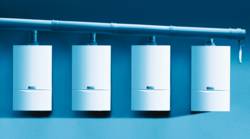New opportunities for commercial boilers

Modular boiler systems can be finely tuned to suit any application. This is a selection of Vaillant ecoMAX boilers.
It has been clear for some years that the UK commercial boiler market has far more potential than the number of installations taking place each year indicate. JOHN BAILEY believes that its prospects have never been better.The commercial boiler market is caught in a maelstrom of change. There are plenty of positive factors pulling it towards a time of growth and prosperity, but with enough negative influences to ensure we know it will not be easy. The new Building Regulations Part L2 is a significant step towards improving and upgrading boiler plant, with the greatest impact on UK carbon emissions to be made from a concerted attempt to tackle existing buildings and their aging heating systems. However, regulations will have no impact on buildings if the owner chooses not to make any improvements. A culture of patch up and keep exists in this country as end users delay major capital outlay for as long as possible; it is also called human nature’ Legislation alone will not transform the commercial boiler market, but the 68% increase in gas prices since 2003* and Corporate Social Responsibility (CSR) rules that have suddenly turned energy into a boardroom issue just might. In the typical UK medium-sized building without air conditioning, the boiler is the main energy consumer. Most heating systems in commercial buildings are ‘well past the 15- or 20-year mark and so are grossly inefficient’, according to the ICOM Energy Association. The Carbon Trust regularly reminds businesses that a 20% improvement in energy efficiency is the equivalent of a 5% increase in a company’s sales and is offering interest free loans to firms committed to making significant investments in improving their energy performance. Recouped energy costs go straight onto the bottom line of a company’s accounts as a saving on overhead. Enhanced Capital Allowances (ECAs) are also available to sweeten the pill for building operators preparing to take the plunge and invest in new heating equipment.
Modular Part L2 states that boilers in new buildings must achieve efficiencies of 84%. The targets for boilers in existing buildings are 80% for natural gas, 81% for LPG and 82% for oil. Modular boiler installations using a combination of condensing and non-condensing models are proving a popular method for achieving the targets of Part L2 in existing buildings. This is because individual boilers need only be 80% efficient (gross) as long as the whole installation achieves 84% efficiency by use of controls, good sizing etc., as stated in the new regulations. Building-services engineers have a range of technological toys to play with, such as zoned control, weather compensation and modular boiler systems that can be finely adjusted to suit any application. For plant with outputs over 100kW, designers are specifying self-learning optimal start/stop control with night setback plus frost protection outside occupied periods to meet the regulations. For plant with outputs from 100 to 500kW, part load efficiency must be achieved either by using multiple boilers with sequencing control and minimal heat loss from non-firing boilers or by using high/low modulation. Fully modulating controls are now essential on all plant over 500 kW. Condensing boilers must be integrated into a system that will allow them to condense as close to 100% of their operating time as possible. Boilers can only condense when the flue gases are at their dew point, which means keeping the return temperature low. Weather-compensation control can be crucial in allowing the system to meet changing demand in the occupied space, while enabling return temperatures fall to ideal condensing conditions for as long as possible.
Oversizing We do not suffer from real temperature extremes in this country — with the exception of the odd summer heat wave — so there is usually plenty of spare capacity in our heating plant. The industry has been rightly criticised for oversizing boilers in the past often by as much as 50%. This is normally as a result of the system designer understandably erring on the side of caution — although a 50% err is a big one! However, oversizing condensing boilers is less of an issue as they can modulate down to reduce return temperatures and so stay in condensing mode for longer. This capability is not an excuse for continued miscalculation, but a further factor for engineers to consider when matching boiler plant to likely demand conditions. Not only is the market ready for change, thanks to a combination of external and internal factors, but it is also evolving into a state where the best engineers have a chance to show their quality. The advent of Competent Person Schemes and quality initiatives like CIBSE’s register of Low Carbon Consultants shows that the market conditions are now right for excellence to rise to the top. Heating-equipment manufacturers must work more closely with design engineers than ever to ensure systems are configured to meet these more challenging, but very welcome, developments.
John Bailey is technical manager for Vaillant Applied Systems’ commercial heating division, Vaillant House, Medway City Estate, Trident Close, Rochester, Kent ME24 4EZ.
Related links:


